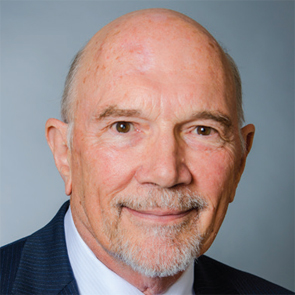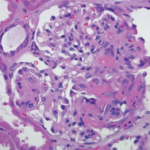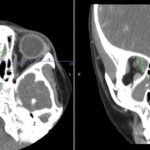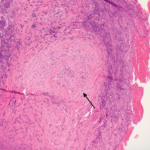Just before the race, she suffered a groin injury while training. She believed it was just a pulled muscle that would heal on its own and entered the race.
Two hours later, she slipped on some ice. She could barely lift her right leg. Still, “It wasn’t that bad,” she says. But by the eighth day, she could no longer stand. She scratched from the race on Day 10, approximately 370 miles from the finish line. Her diagnosis? A fractured pelvis.
Last year, terrible trail conditions prevented Ms. Abbott and 19 other mushers from finishing the Iditarod. There was no snow, which created very dangerous racing conditions. About 200 miles into the race, Ms. Abbott fell on a tree stump, injuring her right shoulder and had to scratch from the 2014 race.
But this year, luck was on her side. Ms. Abbott finished the race in less than 14 days. Since she came in last, she received the red lantern award for perseverance.
“Finishing the Iditarod was much more difficult than climbing Mt. Everest,” she says. “You get an hour or two of sleep here and there. Being responsible for those 16 dogs is huge. While they rest, you have to get their meals ready, check every paw, make sure they’re healthy and happy.”
Show & Tell
Through all of these extreme sports, her disease has not progressed an inch. She and her husband have since sold their house, temporarily to live in Tustin, Calif., and are planning to move within the next several years to Alaska so Ms. Abbott can continue racing.
She speaks at many conferences about her experiences and illness. She authored a self-published book, Reaching Beyond the Clouds: From Undiagnosed to Climbing Mt. Everest, and produced an 84-minute documentary about her adventures, disease and determination. She plans to enter it in the Tribeca and Sundance film festivals, before marketing it to TV or cable broadcasters.
As director of the Center for Rare Disease Therapies in Claremont, Calif., M. Ian Phillips, PhD, also hopes to show the documentary in February on Rare Disease Day, which is hosted by his organization. Dr. Phillips, also the faculty director for the post-baccalaureate pre-medical certificate program at Keck Graduate Institute of Applied Life Sciences, was interviewed about GPA for the documentary.

Dr. Phillips
“[Ms. Abbott] is somebody with a rare disease who has not let it stop her from doing fantastic things,” Dr. Phillips says. “In the end, it’s not about winning, it’s about doing it, finishing it. She’s an inspiration to people with diseases.”



